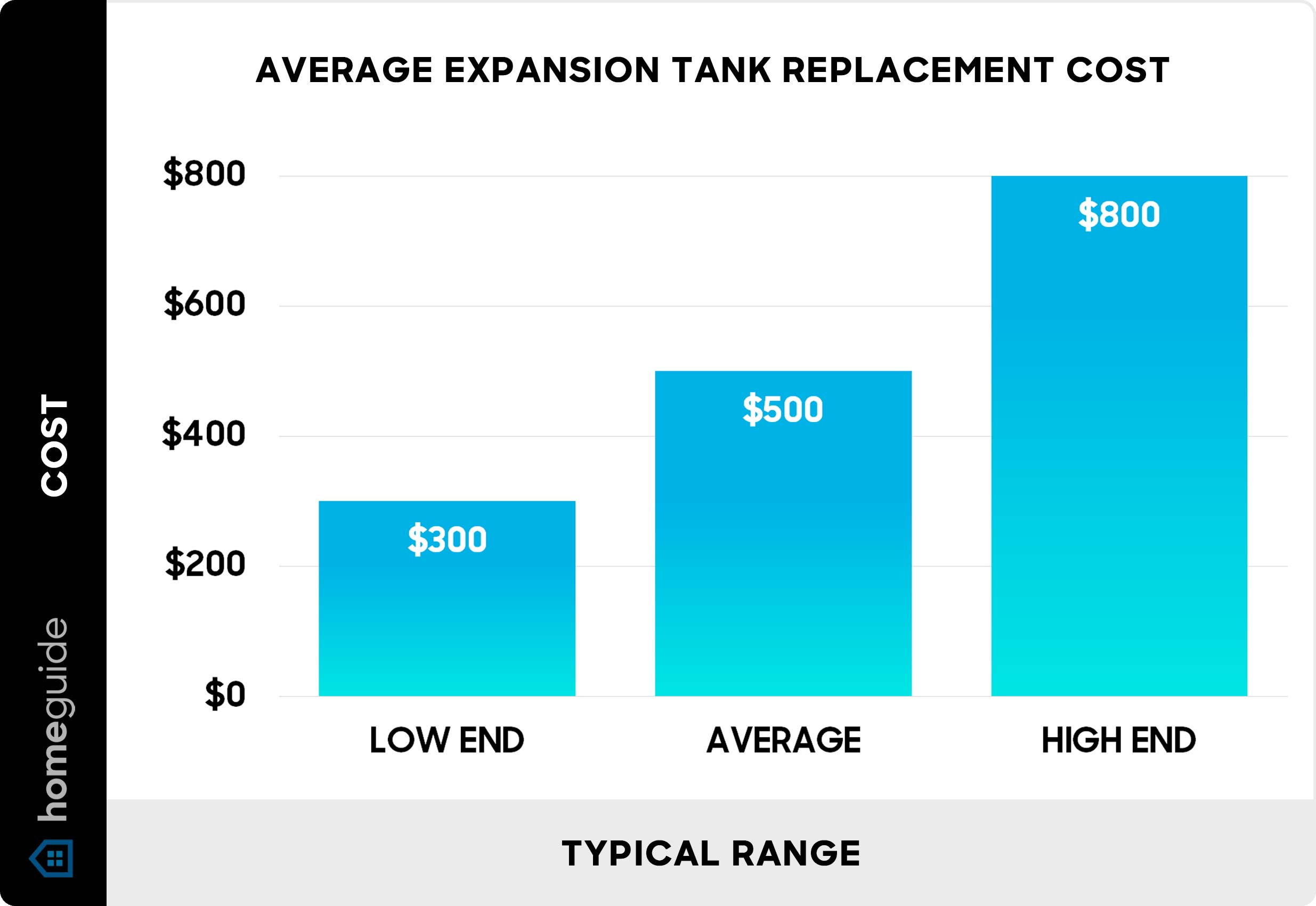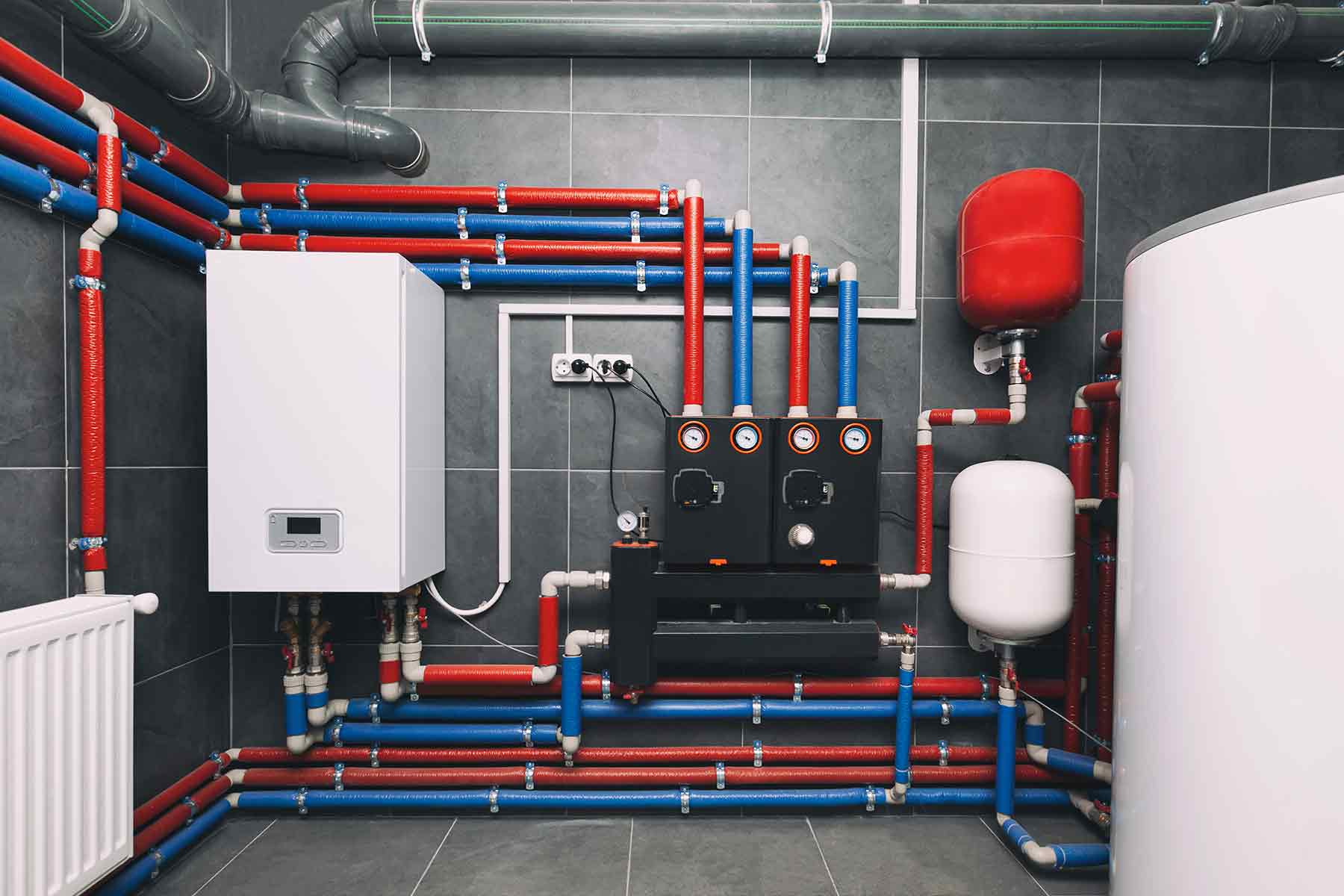
How much does expansion tank replacement cost?
How much does expansion tank replacement cost?
$300 – $800 average total cost
Average expansion tank replacement cost
Expansion tank replacement costs $300 to $800 on average, including professional installation. The total cost to replace an expansion tank depends on the tank size and type, labor rates, and your location. A boiler or water heater expansion tank costs $30 to $200 for the tank alone.

| National Average Cost | $500 |
| Minimum Cost | $200 |
| Maximum Cost | $1,000 |
| Average Range | $300 to $800 |
What affects the cost to replace an expansion tank?
Several factors influence the total cost of expansion tank replacement, from the size and type of tank you need to local labor rates and permit requirements:
Tank size
The size of your expansion tank directly impacts the replacement cost. Smaller tanks for residential water heaters cost less than larger units designed for commercial applications or extensive heating systems.
| Tank size | Average cost* |
|---|---|
| 2 – 3 gallons | $30 – $80 |
| 3 – 4 gallons | $40 – $100 |
| 4 – 5 gallons | $50 – $150 |
| 5+ gallons | $80 – $200 |
*Tank only; not including installation labor
Tank type
Tank prices also vary depending on the tank construction, materials, and intended use:
Bladder vs. plain steel tank: Bladder expansion tanks feature a flexible interior diaphragm that separates water from the air chamber, preventing waterlogging and extending the tank's life. Plain steel tanks are less expensive but require more frequent maintenance and have shorter lifespans.
Water heater vs. boiler expansion tank: Water heater expansion tanks are designed for potable water systems and must meet drinking water standards. Boiler expansion tanks handle heated water in closed-loop systems and don't require potable water ratings.
Labor cost
Professional installation labor accounts for 60% to 70% of the total replacement cost. Labor rates vary significantly by region, and contractors in urban areas tend to charge more than those in rural locations. Labor costs also increase for complex installations that require additional plumbing modifications or if the water heater or boiler is difficult to access.
Permits
Many cities require a permit for expansion tank replacement, especially when upgrading the tank size or type. Permit fees range from $20 to $100+, depending on local requirements. Some contractors include permit costs in their quotes, while others charge separately.
Additional repairs
Expansion tank replacement often reveals related problems that require repairs. On average, other water heater repairs cost $100 to $700+. Common additional repairs and costs include:
Pressure relief valve replacement: $100 to $300
Pressure gauge installation: $100 to $250
Flushing and cleaning the system: $100 to $300
Signs your expansion tank needs replacement
Recognizing the symptoms of a failing expansion tank can help you catch the problem early and prevent the need for more costly repairs. Watch for these warning signs:
Visible rust or corrosion on tank exterior
Water leaking from tank connections
Dents or damage to tank body
Excessive moisture around tank area
Inconsistent hot water pressure
Frequent pressure relief valve discharge
Banging noises from the system
Expansion tank FAQs
What is an expansion tank, and what does it do?
An expansion tank is a safety device that accommodates thermal expansion in water heating systems. When water heats up, it expands and increases pressure within the system. The expansion tank provides a cushion of compressed air that absorbs this pressure increase, preventing damage to pipes, fixtures, and the water heater itself.
How long do expansion tanks last?
Most expansion tanks last 5 to 10 years with proper maintenance. The total lifespan depends on the tank quality and construction, water quality and mineral content, system pressure fluctuations, and maintenance frequency.
Bladder-type tanks last longer than plain steel tanks due to their superior design and construction. Regular inspection and maintenance can extend the tank's life and prevent premature failure.
What size expansion tank do I need?
Residential expansion tank sizes range from 2 to 5 gallons. The ideal expansion tank size depends on your water heater capacity and system pressure (PSI). A professional assessment is the best way to ensure the tank is properly sized for optimal performance and code compliance.
Oversized tanks don't harm system performance but increase costs unnecessarily. Undersized tanks may not provide adequate pressure relief, potentially causing system damage.
Does a water heater need an expansion tank?
A water heater in a closed plumbing system requires an expansion tank to manage thermal expansion. A closed system exists when a pressure-reducing valve, check valve, or water meter prevents heated water from flowing back into the municipal supply.
Most modern homes have closed plumbing systems, making expansion tanks mandatory in many jurisdictions. Local building codes often require expansion tanks for all water heater installations, regardless of the system type.
Does a tankless water heater need an expansion tank?
A tankless water heater only requires an expansion tank when it is part of a closed system, though requirements vary by manufacturer and local building codes. While tankless units don't store large volumes of hot water, they still heat water that expands and pressurizes the system.
Some tankless water heaters include built-in expansion accommodation, eliminating the need for a separate tank. Consult your unit's manual and local codes to determine expansion tank requirements.

Getting quotes for expansion tank replacement
Follow these tips to help you find the best boiler repair techs or water heater repair companies near you:
Get quotes from at least three licensed contractors.
Read reviews on HomeGuide and Google.
Confirm the contractors are licensed and insured.
Ensure the quotes include all costs for labor, permits, and materials.
Compare warranty terms and service guarantees.
Questions to ask repair techs
Ask the boiler or water heater repair tech these questions:
What size expansion tank does my system require?
Do you recommend a bladder or plain steel tank for my application?
Will this installation require a permit? If so, will you obtain it?
How long will the installation take?
Will you dispose of the old tank?
What warranty do you provide on parts and labor?
What maintenance does the new tank require?
Are any additional repairs needed?